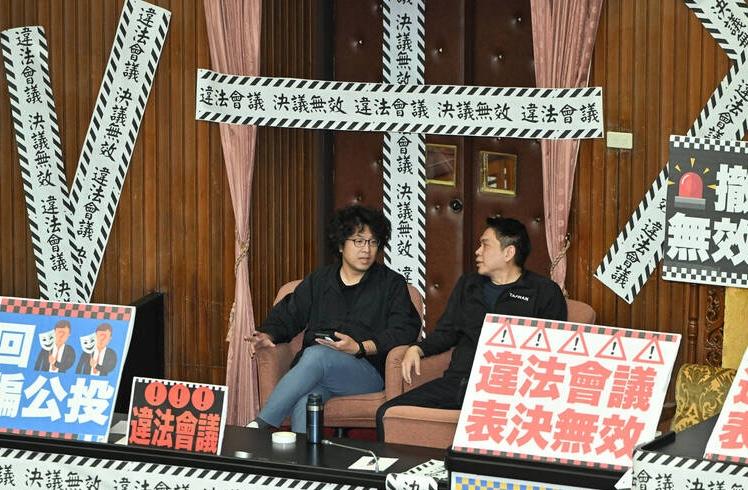Chinese Nationalist Party (KMT) caucus whip Fu Kun-chi (傅崐萁) today urged the Democratic People’s Party (DPP) to abandon its ongoing occupation of the Legislative Yuan, after controversy erupted over two proposed referendums.
DPP caucus chief executive Rosalia Wu (吳思瑤) yesterday accused the KMT and the Taiwan People’s Party (TPP) of conducting a “nighttime raid” on Tuesday by failing to follow proper procedures when passing two referendum bills to a second reading.
On Tuesday, the KMT and TPP met after the usual session times to vote on the motion, with DPP members saying they were not informed.

Photo: Tien Yu-hua, Taipei Times
In the meeting, the opposition parties agreed to propose two referendums, one on opposing the death penalty’s abolition and the other about opposing martial law.
In response to the “raid,” the DPP has organized two consecutive days of sit-ins and submitted an official complaint requesting an investigation by the legislature’s Discipline Committee.
Fu said that the DPP should cease their sit-in as soon as possible, so that lawmakers “can have a good meeting.”
Fu questioned why the DPP, as the ruling party, sought to paralyze the Judicial Yuan, Executive Yuan and Legislative Yuan, asking what the party hopes to achieve by “holding everyone hostage.”
Central Election Commission Chairman Lee Chin-yung (李進勇) today told reporters before appearing at the legislature that the Legislative Yuan has never invoked Article 15 of the Referendum Act (公民投票法) to directly introduce a bill.
Given the lack of precedent and clarity, everyone should review the law calmly and rationally, Lee said.
Article 15 of the act says that if the main text and statement of reasons for a referendum are adopted in a legislative session, the proposal can be referred to the relevant authorities within 10 days.
Asked if the Legislative Yuan acted in a legitimate fashion and if such procedure could become the standard, Lee said that the commission respects the procedures of the Legislative Yuan, but that this issue needs further clarification.

‘DENIAL DEFENSE’: The US would increase its military presence with uncrewed ships, and submarines, while boosting defense in the Indo-Pacific, a Pete Hegseth memo said The US is reorienting its military strategy to focus primarily on deterring a potential Chinese invasion of Taiwan, a memo signed by US Secretary of Defense Pete Hegseth showed. The memo also called on Taiwan to increase its defense spending. The document, known as the “Interim National Defense Strategic Guidance,” was distributed this month and detailed the national defense plans of US President Donald Trump’s administration, an article in the Washington Post said on Saturday. It outlines how the US can prepare for a potential war with China and defend itself from threats in the “near abroad,” including Greenland and the Panama

The High Prosecutors’ Office yesterday withdrew an appeal against the acquittal of a former bank manager 22 years after his death, marking Taiwan’s first instance of prosecutors rendering posthumous justice to a wrongfully convicted defendant. Chu Ching-en (諸慶恩) — formerly a manager at the Taipei branch of BNP Paribas — was in 1999 accused by Weng Mao-chung (翁茂鍾), then-president of Chia Her Industrial Co, of forging a request for a fixed deposit of US$10 million by I-Hwa Industrial Co, a subsidiary of Chia Her, which was used as collateral. Chu was ruled not guilty in the first trial, but was found guilty

A wild live dugong was found in Taiwan for the first time in 88 years, after it was accidentally caught by a fisher’s net on Tuesday in Yilan County’s Fenniaolin (粉鳥林). This is the first sighting of the species in Taiwan since 1937, having already been considered “extinct” in the country and considered as “vulnerable” by the International Union for Conservation of Nature. A fisher surnamed Chen (陳) went to Fenniaolin to collect the fish in his netting, but instead caught a 3m long, 500kg dugong. The fisher released the animal back into the wild, not realizing it was an endangered species at

DEADLOCK: As the commission is unable to forum a quorum to review license renewal applications, the channel operators are not at fault and can air past their license date The National Communications Commission (NCC) yesterday said that the Public Television Service (PTS) and 36 other television and radio broadcasters could continue airing, despite the commission’s inability to meet a quorum to review their license renewal applications. The licenses of PTS and the other channels are set to expire between this month and June. The National Communications Commission Organization Act (國家通訊傳播委員會組織法) stipulates that the commission must meet the mandated quorum of four to hold a valid meeting. The seven-member commission currently has only three commissioners. “We have informed the channel operators of the progress we have made in reviewing their license renewal applications, and